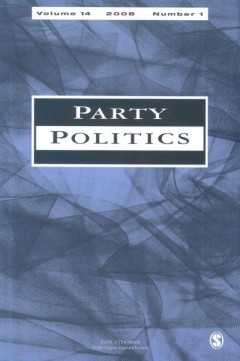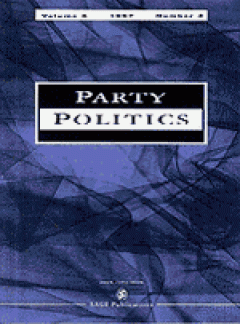Filter by

The Parameters of Party Systems
Despite the scepticism that increasingly surrounds their role and standing in contemporary democracies, scholarly interest in political parties continues unabated. But this interest is also proving uneven, with relatively little attention now being given to the study of party systems. More specifically, the level of theoretical interest in party systems remains limited, with almost no substanti…
- Edition
- Vol. 14, No. 2, March 2008. Page 147-166
- ISBN/ISSN
- 13540688
- Collation
- -
- Series Title
- Party Politics
- Call Number
- -

Recognition Rules, Party Labels and the Number of Parties in India: A Researc…
This Research Note offers an alternative explanation for the variation over time in the number of parties in India's national party system. It is argued that the actual number of parties has changed in direct response to the incentives provided by the official rules and regulations on party recognition. In turn, the raw number of parties has shaped the effective number of parties positively: t…
- Edition
- Vol. 14, No. 2, March 2008. Page 211-222
- ISBN/ISSN
- 13540688
- Collation
- -
- Series Title
- Party Politics
- Call Number
- -

Factions, Parties and the Durability of Parliaments, Coalitions and Cabinets:…
Did Thailand's multiple parties and factions influence cabinet and coalition durability in the period 1979 to 2001? If so, which one — parties or factions — was the more significant? Taking a Transaction Costs Analysis approach, this article addresses these questions and argues that intra-party factions, as the building blocks of Thai parliamentary politics, have been more important than…
- Edition
- Vol. 14, No. 3, March 2008. Page 299-323
- ISBN/ISSN
- 1354-0688
- Collation
- -
- Series Title
- Party Politics
- Call Number
- -

The Christian Democratic Phoenix and Modern Unsecular Politics
Christian democracy is still posing theoretical problems of definition and empirical puzzles of classification and interpretation. Analyses based on secularization theory produce puzzles and anomalies and have little to offer as explanations for the variation in Christian democratic power mobilization. Empirically, this article focuses on Christian democracy in The Netherlands and offers an exp…
- Edition
- Vol. 14, No. 3, May 2008. Page 259-279
- ISBN/ISSN
- 1354-0688
- Collation
- -
- Series Title
- Party Politics
- Call Number
- -

Factors Influencing the Decision of the Young Politically Engaged To Join a P…
Situated in the literature concerning the decline of party members, and the dearth of young party members, this article considers the factors that influence the decision of a politically engaged young person to join, or not join, a political party. Making use of a unique dataset, we examine the attitudes and socialization of a large group of politically active young Canadians, a group that incl…
- Edition
- Vol. 14, No. 3, May 2008. Page 345-369
- ISBN/ISSN
- 13540688
- Collation
- -
- Series Title
- Party Politics
- Call Number
- -

The Political Representation of Ethnic Minorities: Denmark as a Deviant Case
In general, ethnic minorities are strongly under-represented in representative bodies; however, there is no rule without exceptions. In the municipal elections in Denmark in 2001, the number of ethnic minorities who won election to the local councils throughout the country almost corresponded to their percentage in the general population. The explanation for this can be found in the Danis…
- Edition
- Vol. 14, No. 3, May 2008. Page 325-343
- ISBN/ISSN
- 13540688
- Collation
- -
- Series Title
- Party Politics
- Call Number
- -

Parties and Leader Effects: Impact of Leaders in the Vote for Different Types…
In this article, I analyse whether the electorate of different party types attributes different degrees of importance to leaders, as suggested by a recent party typology. Based on expert advice, 15 parties in six democracies were assigned to the following party types: class-mass, denominational and catch-all. Individual level data are used to determine the relative importance of leader ef…
- Edition
- Vol. 14, No. 3, May 2008. Page 281-298
- ISBN/ISSN
- 1354-0688
- Collation
- -
- Series Title
- Party Politics
- Call Number
- -

Centre-Right Parties and Political Outcomes in East Central Europe
The emergence of moderate centre�right parties in East Central Europe after 1989 was closely related to the strength and nature of organized opposition during the late communist period. Where such opposition was strong enough to take power, it went on to become the ideological, organizational and elite base for one or more moderate right parties. Where it was weak, moderate right parties were…
- Edition
- Vol. 14, No. 4, July 2008. Page 387-405
- ISBN/ISSN
- 13540688
- Collation
- -
- Series Title
- Party Politics
- Call Number
- -

Sticking Together: Explaining Comparative Centre-Right Party Success in Post-…
In this article, we attempt to explain varying patterns of centre�right success between 1990 and 2006 in three post-communist states � Hungary, Poland and the Czech Republic. Success is understood as the ability to construct broad and durable parties. Both macro-institutional explanations, focusing on executive structures and electoral systems, and historical�structural explanations, stres…
- Edition
- Vol. 14, No. 4, July 2008. Page 407-434
- ISBN/ISSN
- 1354-0688
- Collation
- -
- Series Title
- Party Politics
- Call Number
- -

From the Politics of State-Building To Programmatic Politics: The Post-Federa…
The post-federal experience was important in shaping the structure of party competition in Central and Eastern Europe in the 1990s, particularly on the centre�right. The cases of Slovakia and Croatia demonstrate not only how and why appeals relating to national autonomy/statehood became salient in some states in the region, but also why dominant parties stressing such themes were unable to lock…
- Edition
- Vol. 14, No. 4, July 2008. Page 435-454
- ISBN/ISSN
- 13540688
- Collation
- -
- Series Title
- Party Politics
- Call Number
- -

Why Is There No Christian Democracy in Poland - and Why Should We Care?
Despite the fact that almost all Poles are Roman Catholics and that religion has played an important part in contemporary Polish politics, no self-declared Christian Democratic party has been successful in post-1989 Poland. None of the currently successful Polish centre�right parties profile themselves as Christian Democratic, nor can they be labelled as such objectively. While, superficially,…
- Edition
- Vol. 14, No. 4, July 2008. Page 479-500
- ISBN/ISSN
- 13540688
- Collation
- -
- Series Title
- Party Politics
- Call Number
- -

Searching for the Right Organization: Ideology and Party Structure in East-Ce…
The article examines four centre�right parties in East-Central Europe in order to assess the impact of ideology on party organization and revisit the thesis of organizational weakness in the region. The data collected indicate that, together with electoral success, inherited resources and national context, ideology does indeed shape the style of organization. Centre�right parties, as opposed …
- Edition
- Vol. 14, No. 4, July 2008. Page 455-477
- ISBN/ISSN
- 1354-0688
- Collation
- -
- Series Title
- Party Politics
- Call Number
- -

Europeanization as Heresthetics: Party Competition over Self-Government for S…
This article is a theoretical and empirical contribution to the study of the Europeanization of political parties. On the theoretical side, it draws on the concepts of heresthetics and two-level games to conceptualize a Europeanization mechanism that has so far been overlooked in the literature. It shows that Europeanization can be a heresthetic tool in party competition, notably in terms of op…
- Edition
- Vol. 15, No. 1, January 2009 pp. 49-68
- ISBN/ISSN
- 13540688
- Collation
- -
- Series Title
- Party Politics
- Call Number
- -

Populists, Outsiders and Anti-Establishment Politics
In this article, I attempt to clarify the relationships among three contemporary concepts that are often used interchangeably or conflated in the literature: anti-establishment politics, political outsiders and populism. In order to make sense of these manifestations of public discontent, I argue that one must examine the nature of political appeals, political actors' locations vis-�-vis the pa…
- Edition
- Volume 15, Number 1, January 2009. pp. 29-48
- ISBN/ISSN
- 1354-0688
- Collation
- -
- Series Title
- Party Politics
- Call Number
- -

Government Formation in Multi-Level Settings: Spanish Regional Coalitions and…
It is generally assumed that in multi-level political systems political actors desire to form regional coalitions that match the party composition of the coalition governing at the central level, and that where this matching attempt does not occur it is because a possible new coalition formula for the central level is being tested at the regional one. This article shows that the congruence of p…
- Edition
- Volume 15, Number 1, January 2009. pp. 93-115
- ISBN/ISSN
- 1354-0688
- Collation
- -
- Series Title
- Party Politics
- Call Number
- -

Taking Europe To Its Extremes
This article revisits the age-old debate about elite�mass linkages in the European Union (EU) by examining the way in which political contexts shape individual differentiation in Euroscepticism. We argue that the growing uncertainties about the future of European integration among national publics are increasingly politicized by Eurosceptical elites on both the extreme right and left of the pol…
- Edition
- Volume 15, Number 1, January 2009. pp. 5-28
- ISBN/ISSN
- 13540688
- Collation
- -
- Series Title
- Party Politics
- Call Number
- -

The Dynamic Character of Political Party Evaluations
Over the past 50 years, the American public has consistently been asked to compare the two major parties' ability to handle a variety of issues. The meaning of their answers is an under-studied phenomenon. In this article, I explore changes in comparative party evaluations over time and the source of those changes in attitudes towards the parties. Previous research is based on the assumption th…
- Edition
- Volume 15, Number 1, January 2009. pp. 69-92
- ISBN/ISSN
- 13540688
- Collation
- -
- Series Title
- Party Politics
- Call Number
- -

Understanding Post-Devolution Elections in Scotland and Wales in Comparative …
In this article, we explore the electoral dynamics of multi-level political systems for the case of the United Kingdom (Scotland and Wales) through a comparison with multi-level voting behaviour in Germany, Spain and Canada. The analysis suggests that sub-state elections can be `second order' in relation to state-wide elections, but that this `second orderness' is reduced when more powers are d…
- Edition
- Vol. 15, No. 2, September 2009. pp. 219-240
- ISBN/ISSN
- 13540688
- Collation
- -
- Series Title
- Party Politics
- Call Number
- -

Multi-Level Relations in Political Parties: A Delegation Approach
Most political parties operate on several territorial levels, but we have only limited theoretical understanding of multi-level party dynamics. This article presents a delegation framework for studying the interaction between the national leadership and regional branches in state-wide parties. Assuming a principal�agent relationship, the national leadership can obtain benefits from delegating t…
- Edition
- Vol. 15, No. 2, September 2009.pp. 137-156
- ISBN/ISSN
- 13540688
- Collation
- -
- Series Title
- Party Politics
- Call Number
- -

Patterns of Party Integration, Influence and Autonomy in Seven Federations
In this article, I develop three measures of party organization in multi-level systems: vertical integration, influence and autonomy. I assess these in 27 parties in Canada, Australia, Germany, Austria, Switzerland, the United States and Spain and investigate how parties respond to the incentives and opportunities created by their institutional environment. Clear patterns emerge between the for…
- Edition
- Vol. 15, No. 2, September 2009.pp. 157-177
- ISBN/ISSN
- 13540688
- Collation
- -
- Series Title
- Party Politics
- Call Number
- -
 Computer Science, Information & General Works
Computer Science, Information & General Works  Philosophy & Psychology
Philosophy & Psychology  Religion
Religion  Social Sciences
Social Sciences  Language
Language  Pure Science
Pure Science  Applied Sciences
Applied Sciences  Art & Recreation
Art & Recreation  Literature
Literature  History & Geography
History & Geography